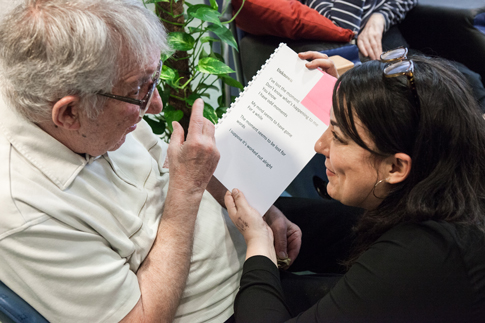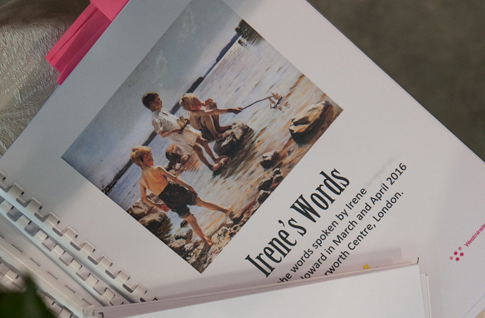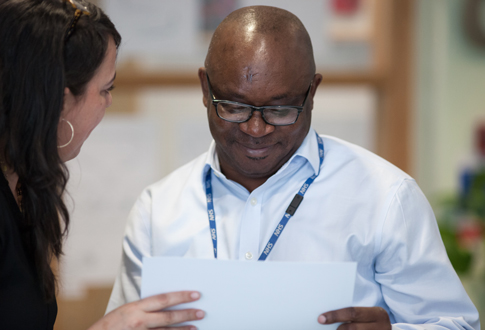Helping the voices of people with dementia to be heard even when communication seems lost
From the June/July 2016 issue of our magazine, communication can become increasingly challenging as dementia progresses. Andrew Bence finds out about a project that helps people to be heard.

Living Words, an organisation led by Susanna Howard, has been working with people with dementia since 2007. Team members encourage free expression, enabling people to be heard and understood even when communication seems lost.
Through residencies in day centres, theatres and care homes, Susanna and her small team of artists have honed a special way of working one-to-one with people.
Over time, they listen to, talk with and – most important of all – hear the person they are with. They give their undivided attention, recording the person's words exactly as spoken.
Now, nearing the end of a residency in north-west London, Susanna and her colleagues present these words back to the people they have worked with, poem-like and in the form of books.
Anticipation
The lobby of the Butterworth Centre, a continuing care unit based at the Hospital of St John and St Elizabeth in London, is being made suitable for the presentation.
Residents, staff and visitors arrive and gradually settle. The atmosphere is one of anticipation.
Quiet words are exchanged, a helping hand extended, reassurances sought and given, and there is a sudden uncensored outburst, heartfelt and difficult to interpret.

Drawn out
Attending is Angela, whose husband of 40 years, Michael, died recently. He lived at the centre for the last two years and took part in the project, and Angela is here to collect his book.
She says,
'To be honest, I was sceptical about it. I thought this is beyond Michael. By this point he was reduced to short sentences, verbiage, mutterings. What could be drawn out?
'On the other hand, he was a highly educated, articulate man. It might spark something. And I know he enjoyed the one-to-one attention, as most people do.'
Susanna, an actor and writer, is passionate about the method she has devised.
Some elements are simple and appear obvious – spending quality time with a person, actively listening to and acknowledging what they say. But then many people with advanced dementia find these intimacies increasingly denied them.
Their own words
Michael: 'I'm very pleased. I'm very glad we're going this evening. After too many years. Rather a trick of a life. Extraordinary isn't it, this house.'
Jennifer: 'Am I a dream? No, I am here.'
Peter: 'My mind seems to have gone. For a while, the moment seems to be lost for words. I suppose it's worked out alright.'
Honouring the person
Susanna's team never lose sight of the individual. Perhaps because they are artists by training, they see the potential for creative communication and reflection in these encounters.
At the heart of their endeavours is a desire to honour the person they are with, and a compassion and sensitivity that is moving to observe. This is not about who they were but who they are, and how they are feeling, here and now.
Susanna says,
'Our work is not concerned with recalling memories so much as expressing feelings.
'Too often people just see what the person with dementia cannot do, compounding their isolation. We need to go deep with them, and others need to see that this is still possible.'
'Others' include the professional carers the Living Words team work alongside and for whom they run workshops.

Shown the way
As well as presenting people's words at the event, Living Words gives certificates to staff who attend their workshops, recognising their work and commitment to develop the project's legacy. Atumanni, the centre manager, expresses his delight.
'This has exceeded my expectations. I didn't think this level of engagement was any longer possible for my patients. I am so pleased.'
His colleague, Christina, adds,
'They have shown us the way. We think they live in another universe, but to hear from our patients in this way, in words that resonate with us all, is very moving.'
Angela says,
'I'm very touched, reading the things Michael said, and pleased to see the staff recognised for all that they do.
'Perhaps what most came across was Michael's concern for other people. You see, he never thought there was anything much wrong with him, but he cared about the people living here.'








